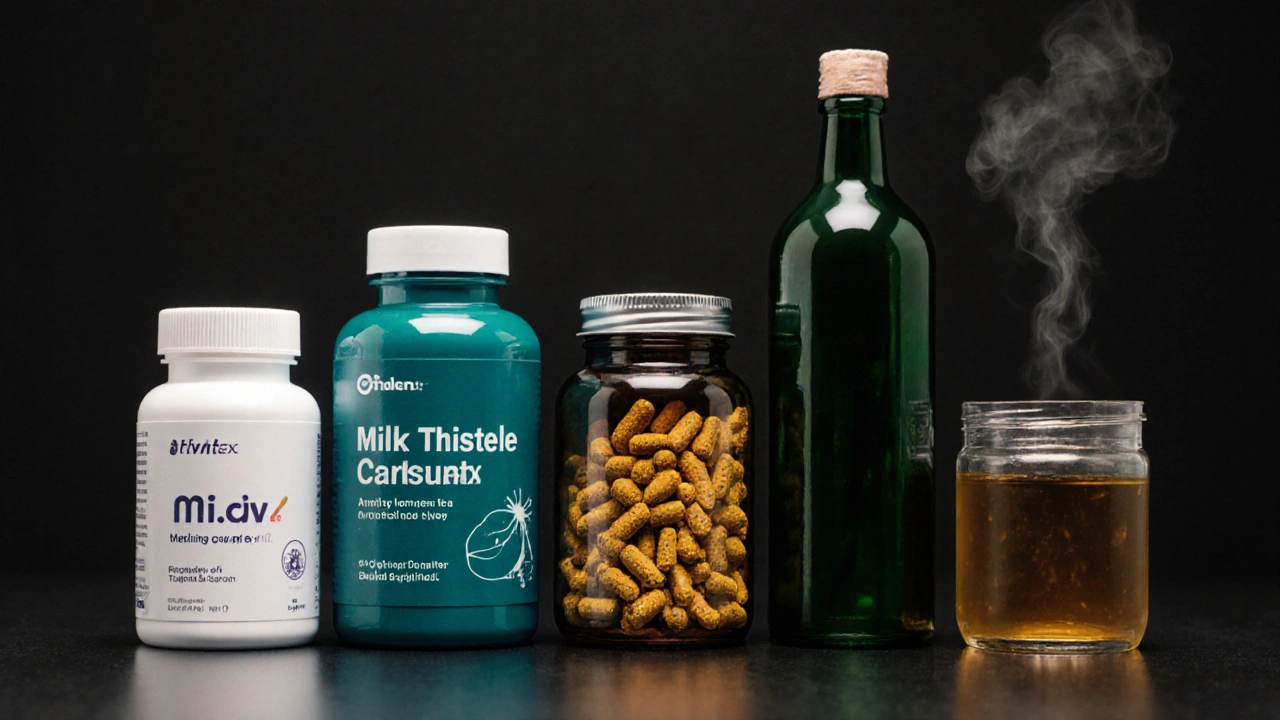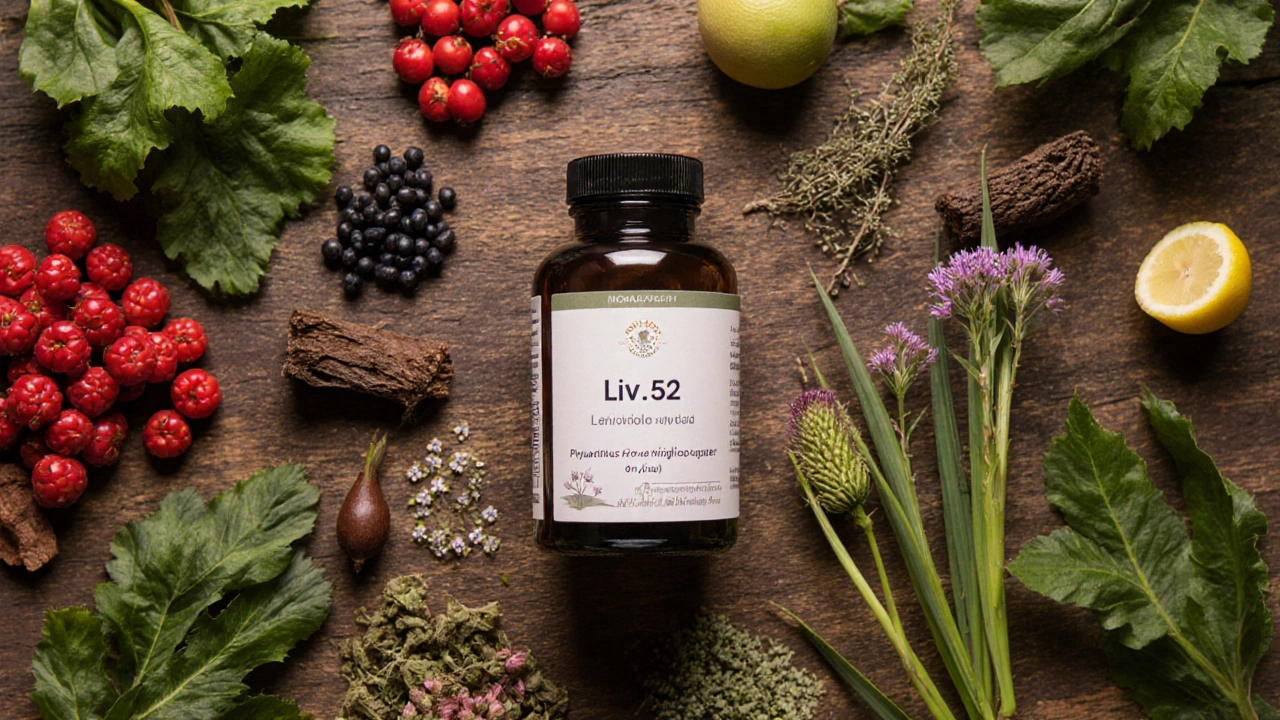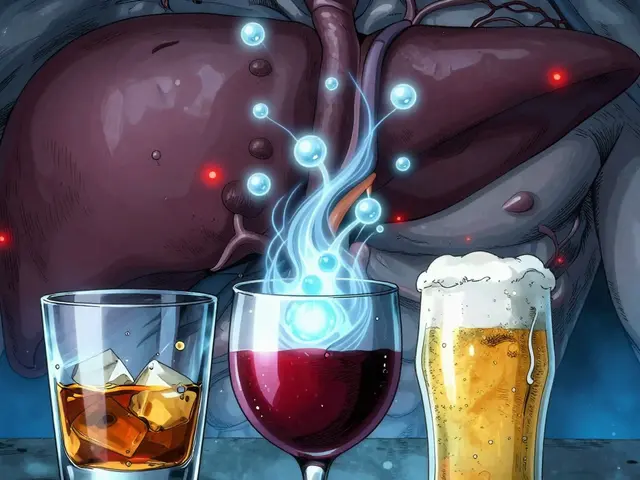Liver Supplement Selector
Recommended Supplement
Looking for a liver‑boosting supplement but not sure whether Liv.52 is the best fit? You’re not alone. Millions of people search for a safe, effective way to protect their liver, and the market is crowded with herbs, extracts, and proprietary blends. This guide cuts through the noise, compares Liv.52 with the most popular alternatives, and gives you a practical framework for picking the right product for your needs.
Quick Takeaways
- Liv.52 offers a broad‑spectrum Ayurvedic blend targeting detox, antioxidant support, and regeneration.
- Milk Thistle (silymarin) is the most researched single‑herb option, especially for alcohol‑related liver stress.
- Turmeric (curcumin) adds powerful anti‑inflammatory action but needs a bio‑available formulation.
- Artichoke leaf extract and Dandelion root excel at bile flow and fat digestion, useful for cholesterol‑related issues.
- Price, dosage convenience, and clinical evidence vary widely-use the decision matrix below to match a supplement with your health goals.
What Is Liv.52?
Liv.52 is a herbal formulation produced by Himalaya Drug Company that claims to protect liver cells, promote regeneration, and support overall hepatic function. Launched in the early 1990s, the product blends 12 botanicals, including capers, chicory, and black nightshade, under a proprietary Ayurvedic protocol.
Liv.52 is marketed as a “liver tonic” for people who drink alcohol regularly, take long‑term medications, or simply want to boost liver resilience. In the UK it is sold as a food supplement, not a medicine, so the claims are limited to supporting normal liver function.
Core Ingredients and How They Work
- Caper (Capsicum frutescens) - rich in flavonoids that scavenge free radicals.
- Chicory (Cichorium intybus) - stimulates bile production, aiding fat digestion.
- Black Nightshade (Solanum nigrum) - contains glycoalkaloids shown in animal studies to protect hepatocytes.
- Arjun (Terminalia arjuna) - supports antioxidant enzymes like superoxide dismutase.
- Yarrow (Achillea millefolium) - anti‑inflammatory polyphenols reduce liver inflammation.
- Hawthorn (Crataegus oxyacantha) - improves microcirculation within the liver.
- Phyllanthus (Phyllanthus niruri) - traditionally used for hepatitis; contains lignans that inhibit viral replication. \n
- Jujube (Ziziphus jujuba) - antioxidant triterpenes that help cell repair.
- Tamarind (Tamarindus indica) - contains organic acids that aid detox pathways.
- Kadam (Nephrolepis biserrata) - fern frond extract with hepatoprotective flavonoids.
- Lemongrass (Cymbopogon citratus) - essential oils that reduce oxidative stress.
- Milk Thistle (Silybum marianum) - included in small amounts, offering silymarin’s classic liver‑shielding effect.
Each herb contributes a specific mechanism-antioxidant, anti‑inflammatory, bile‑stimulating, or cell‑regenerative-so the blend aims for a “multiple‑hit” protection strategy.

Top Alternatives to Liv.52
Milk Thistle (Silymarin)
Milk Thistle is a single‑herb supplement derived from the seeds of Silybum marianum. Its active complex, silymarin, has been studied in over 150 clinical trials, showing benefits for alcoholic liver disease, non‑alcoholic fatty liver disease (NAFLD), and drug‑induced toxicity.
Typical dose: 150‑300mg of standardized silymarin (70‑80% flavonolignan) taken 1‑3 times daily.
Turmeric (Curcumin)
Turmeric contains curcumin, a polyphenol with strong anti‑inflammatory and antioxidant properties. Because curcumin has low oral bioavailability, most reputable products combine it with piperine or use liposomal technology.
Typical dose: 500‑1000mg of curcumin (with ≥5% piperine) per day.
Artichoke Leaf Extract
Artichoke Leaf Extract (Cynara scolymus) boosts bile secretion and protects liver enzymes. A 2023 European study found a 12‑week course reduced ALT and AST levels in patients with mild steatosis.
Typical dose: 300‑500mg of standardized extract (≥5% cynarin) twice daily.
Dandelion Root
Dandelion Root (Taraxacum officinale) is prized for its diuretic effect and ability to enhance bilirubin clearance. It’s a gentle option for people who want a mild liver‑supportive tea or capsule.
Typical dose: 500‑1000mg of dried root powder or a 2‑gram tea infusion per day.
Essentiale (Phospholipid‑Based)
Essentiale is a prescription‑only phosphatidylcholine preparation that replenishes cell‑membrane phospholipids after injury. While not a “herbal” option, it’s often listed alongside Liv.52 for patients with viral hepatitis or post‑surgical liver stress.
Typical dose: 1‑2g of phosphatidylcholine daily, divided into two doses.
Side‑by‑Side Comparison
| Product | Key Ingredients | Primary Benefits | Typical Dosage | Clinical Evidence | UK Price (30‑day supply) | Verdict |
|---|---|---|---|---|---|---|
| Liv.52 | 12‑herb Ayurvedic blend (incl. Milk Thistle, Caper, Chicory) | Antioxidant, bile‑stimulating, hepatocyte regeneration | 2 tablets (≈600mg) twice daily | Several small RCTs in India; limited Western data | £12‑£15 | Broad‑spectrum, good for general wellness |
| Milk Thistle (silymarin) | Silymarin (70‑80% flavonolignans) | Strong antioxidant, protects against toxins | 150‑300mg 1‑3×/day | 150+ trials; strong evidence for NAFLD & alcohol‑induced damage | £9‑£13 | Best for evidence‑based liver protection |
| Turmeric (curcumin) | Curcumin + piperine or liposomal delivery | Anti‑inflammatory, supports liver‑fat metabolism | 500‑1000mg daily | Meta‑analyses show reduced liver enzymes in metabolic syndrome | £10‑£18 | Great for inflammation, needs bio‑availability boost |
| Artichoke Leaf Extract | Cynarin‑rich extract | Increases bile flow, lowers ALT/AST | 300‑500mg twice daily | 2023 EU RCT (n=124) positive outcomes | £11‑£14 | Ideal for cholesterol‑related liver stress |
| Dandelion Root | Taraxacum officinale root powder | Diuretic, bilirubin clearance, mild antioxidant | 500‑1000mg or 2g tea daily | Small pilot studies; safe profile | £6‑£9 | Budget‑friendly, gentle option |
| Essentiale (phosphatidylcholine) | Phosphatidylcholine (PC) 1‑2g | Membrane repair, rapid enzyme normalization | 1‑2g divided | Prescription‑level studies in hepatitis C & post‑op patients | £25‑£30 (requires GP prescription) | Best for medically‑supervised liver injury |
Pros and Cons of Liv.52
Pros
- Multi‑herb formulation addresses several pathways at once.
- Relatively low price and easy to find in UK health stores.
- Contains Milk Thistle, giving a baseline of proven benefit.
- Gentle on the stomach; suitable for most adults.
Cons
- Clinical data largely from Indian cohorts; limited peer‑reviewed Western trials.
- Dosage (four tablets per day) may be inconvenient for some.
- Ingredient list is long, which can increase risk of mild GI upset or allergen exposure.
- Regulated as a supplement, so quality control varies by batch.
How to Choose the Right Liver Supplement
Use the following checklist to match a product with your personal health picture.
- Specific liver issue? If you have alcohol‑related damage or hepatitis, prioritize Milk Thistle or Essentiale. For cholesterol‑related fat buildup, Artichoke shines.
- Evidence priority? Want the most peer‑reviewed data? Milk Thistle wins. If you like a broader Ayurveda approach, Liv.52 fits.
- Budget and convenience? Dandelion root is the cheapest, while Essentiale requires a prescription and costs more.
- Allergy concerns? Check for nightshade (Liv.52) or sulfite additives (some curcumin formulas).
- Desired dosage frequency? Fewer pills per day → Turmeric or Artichoke (twice daily). More frequent → Liv.52 (four tablets).
In practice, many users stack a base of Milk Thistle with a targeted herb (e.g., Turmeric for inflammation). Always start with the lowest effective dose and monitor liver enzymes after 4‑6 weeks.
Safety, Interactions, and When to See a Doctor
All the products listed are generally regarded as safe for healthy adults, but there are a few red flags:
- Liv.52 contains black nightshade, which can be toxic in high concentrations for people with kidney issues.
- Milk Thistle may increase the activity of certain CYP450 enzymes, potentially lowering the effectiveness of drugs like warfarin.
- Turmeric’s piperine can boost the absorption of medications, sometimes leading to higher plasma levels of antibiotics or antidepressants.
- Essentiale should only be used under medical supervision because high phosphatidylcholine doses affect lipid metabolism.
If you experience persistent nausea, jaundice, or a sudden rise in liver enzymes, stop the supplement and consult your GP.
Putting It All Together: Sample Regimens
Below are three sample plans for typical user scenarios. Adjust doses based on product label and personal tolerance.
- General Wellness (no liver disease): Liv.52 - 2 tablets twice daily OR Dandelion root tea twice daily.
- Alcohol‑Related Stress: Milk Thistle 150mg three times daily + Turmeric 500mg with piperine once daily.
- Non‑Alcoholic Fatty Liver (NAFLD): Artichoke leaf extract 500mg twice daily + Lifestyle changes (diet, exercise).
Frequently Asked Questions
Can I take Liv.52 and Milk Thistle together?
Yes, because Liv.52 already contains a small amount of Milk Thistle. Adding a separate silymarin supplement can boost the total dose, which is safe for most people. Just keep the combined silymarin intake under 600mg per day to avoid mild GI discomfort.
Is Liv.52 suitable for vegans?
The tablets are plant‑based and contain no animal-derived excipients, so they are vegan‑friendly. Always check the label for gelatin‑based coating, though most UK batches are cellulose‑coated.
How long should I use a liver supplement?
Most studies run 8‑12 weeks. If you’re using the product for prevention, a daily dose year‑round is fine, but annual liver‑function tests are advisable to track any changes.
Do any of these supplements interact with statins?
Artichoke leaf extract can modestly increase the metabolism of certain statins, potentially lowering their effectiveness. If you’re on a high‑dose statin, discuss with your doctor before adding artichoke.
Which supplement offers the best value for money?
For pure evidence‑based protection, Milk Thistle gives the highest benefit‑to‑cost ratio (≈£0.04 per mg of silymarin). If you want a broader herb blend, Liv.52 remains the most affordable multi‑herb option.








Posts Comments
Neil Greer October 10, 2025 AT 15:17
Liv.52 seems like a decent all‑rounder for basic liver care.
Fionnuala O'Connor October 11, 2025 AT 19:04
Give it a try if you want a simple supplement that covers the basics. It’s affordable and easy on the stomach. Keep an eye on your liver tests and adjust if needed.
Christopher MORRISSEY October 12, 2025 AT 22:51
When one surveys the contemporary marketplace for hepatoprotective agents, it becomes evident that the spectrum of therapeutic intent ranges from narrowly focused phytochemicals to expansive polyherbal formulations, each predicated upon distinct mechanistic rationales. Liv.52, for instance, embodies an Ayurvedic paradigm wherein twelve botanicals are synergistically combined to simultaneously potentiate antioxidative pathways, augment bile secretion, and foster hepatocyte regeneration. By contrast, silymarin derived from Milk Thistle offers a monolithic approach, concentrating on flavonolignan-mediated scavenging of reactive oxygen species and stabilization of cellular membranes, a strategy substantiated by over one hundred and fifty randomized controlled trials across diverse populations. Turmeric’s curcumin, albeit hampered by limited bioavailability, introduces a potent anti‑inflammatory cascade through NF‑κB inhibition, a property especially pertinent for metabolic‑associated fatty liver disease. Artichoke leaf extract contributes cynarin‑driven cholagogue activity, thereby ameliorating intra‑hepatic lipid accumulation and reducing serum transaminases in clinical investigations conducted within the European Union. Dandelion root, while modest in its enzyme‑modulating capacity, provides a diuretic effect that may facilitate bilirubin clearance in individuals with mild cholestasis. The phospholipid preparation Essentiale, though prescription‑only, directly replenishes phosphatidylcholine stores, expediting membrane repair after hepatic insult. From a pharmacoeconomic perspective, Liv.52 occupies a niche of relative affordability (£12‑£15 per month) while delivering a multimechanistic profile, yet its evidentiary foundation remains primarily confined to Indian cohorts, limiting extrapolation to Western patient demographics. Conversely, Milk Thistle’s robust data set renders it the benchmark for evidence‑based hepatoprotection, albeit at a comparable cost. Ultimately, the clinician or consumer must weigh variables such as target pathology, desired mechanistic breadth, regulatory status, and fiscal constraints when selecting an appropriate hepatic adjunct. In practice, many patients elect to stack a baseline of silymarin with a targeted agent-be it curcumin for inflammation or artichoke for cholestatic tendencies-thereby customizing therapy to individual pathophysiology while maintaining vigilance through periodic liver function testing.
Adam O'Rourke October 14, 2025 AT 02:37
Oh great, four tablets a day? Because who doesn’t love a pocket‑full of pills 🙃
Mary-Pat Quilty October 15, 2025 AT 06:24
Wow, that’s sooo poetic! Liv.52 – the herbal symphony that dances in your liver like a leprechaun on a moonlit night. If you’re feeling fancy, give it a whirl and watch the magic happen!
Keisha Moss Buynitzky October 16, 2025 AT 10:11
I appreciate the comprehensive analysis presented. It is evident that the author has undertaken a diligent review of the available literature. Such thoroughness is commendable and assists readers in making informed decisions regarding hepatic supplementation.
Shivam yadav October 17, 2025 AT 13:57
From a holistic standpoint, the choice often depends on personal health goals and budget constraints. Liv.52 offers a balanced profile for general wellness, whereas targeted extracts like silymarin or curcumin may be preferable for specific conditions.
pallabi banerjee October 18, 2025 AT 17:44
That makes sense. Simple, clear advice is helpful for people who are just starting to think about liver health. Stick to the recommended doses and monitor how you feel.
Alex EL Shaar October 19, 2025 AT 21:31
While your sentiment is well‑intentioned, the phrasing "Stick to the recommended doses and monitor how you feel" suffers from a lack of precision. "Recommended doses" vary across formulations; one should specify milligrams of active constituents, e.g., 150‑300 mg of standardized silymarin. Moreover, advising users to "monitor how you feel" is scientifically vague-objective liver function tests (ALT, AST) provide a reliable metric. Finally, the sentence structure is overly simplistic for a topic that warrants nuanced discussion.
Anna Frerker October 21, 2025 AT 01:17
All this talk about herbs just shows how people love to “natural‑ify” everything without real progress.
Write a comment